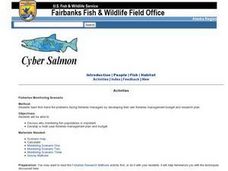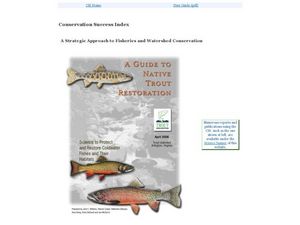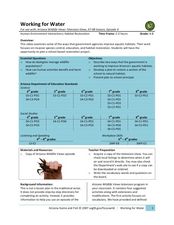NOAA
Sustaining Our Ocean Resources
Lead young scientists on an investigation of fishery practices with the final installment of this four-part unit. Using a PowerPoint presentation and hands-on simulation, this instructional activity engages children in learning how fish...
Curated OER
Fisheries Monitoring
Students discuss why monitoring fish populations is important. They develop a multi-year fisheries management plan and budget.
Michigan Sea Grant
Fish Habitat and Humans
Strict habitat requirements are needed for the survival of fish populations and fish variety in the Great Lakes. Young scientists become experts in the basic needs of fish and understand how survival necessities can vary with different...
Curated OER
Fisheries Research Methods
Learners explore how scientists keep track of fish populations and why it is important to do so. They describe three methods currently used to sample fish populations. They participate in activities to simulate several of the sampling...
Curated OER
Are There Too Many Elk?
Students study elk populations in Arizona. In this data lesson students read an article on monitoring elk populations, analyze data and make management recommendations.
Curated OER
Are There Too Many Elk?
Students use information about elk populations in Arizona to make recommendations about population management. In this ecology lesson, students discover the problems associated with having a heard of elk that is too large. After...
Curated OER
Water Quality Monitoring
Pupils comprehend the four parameters of water quality. They perform tests for salinity, dissolved oxygen, pH and clarity or turbidity. Students comprehend why scientists and environmental managers monitor water uality and aquatic...
Curated OER
Designing for Salmon and Steelhead
Sixth graders create designs for salmon habitats. They work in groups to design a tank habitat that mimics the requirements for salmon in various phases of its life cycle. Students may also raise salmon eggs as part of this unit.
Curated OER
Conservation Success Index
Students read information about trout habitat preservation and visit the various links to learn a fish species and its current habitat range. In this habitat conservation lesson, students read passages about use the Trout Unlimited...
Curated OER
Salmon Life Cycles
Young scholars list salmon life cycle stages in order, list three threats that salmon face throughout their lives, and examine important role native fish play in aquatic food chains throughout their life cycles.
Discovery Education
Sonar & Echolocation
A well-designed, comprehensive, and attractive slide show supports direct instruction on how sonar and echolocation work. Contained within the slides are links to interactive websites and instructions for using apps on a mobile device to...
Curated OER
Biomanipulation
Students explore the effects of aquatic trophic relationships on water transparency. They observe and explain the effects of reducing nutrient inputs on agal density on water transparency.
Michigan Sea Grant
Wetlands
Wetlands may not sound particularly ornate, but they are as important as any habitat! With a hands-on activity, young scientists build a wetland model and observe its many functions in action. They discover the importance of wetlands to...
Curated OER
Working for Water
Learners examine the ways that government works to help improve aquatic habitats. In this water habitats lesson students view a video and plan a school restoration project.















